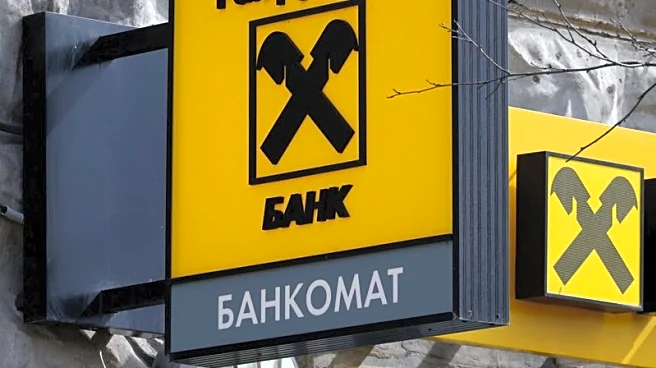By John O'Donnell and Alexandra Schwarz-Goerlich
VIENNA (Reuters) -Raiffeisen Bank International has failed in another attempt to sell a stake in its Russian business, two people familiar with the situation
said, as Russia seeks to maintain a key financial bridge to the West.
Raiffeisen's bank in Russia is the biggest lender in the country that is not subject to sanctions which have isolated local rivals, making it of critical importance for trade payments with Russia, including gas exports to Europe.
Russian officials opposed a sale in part because they were concerned that a Russian buyer taking the stake could result in Western sanctions against RBI, the first person said.
Both spoke on condition of anonymity due to the sensitivity of the matter.
STRANDED BILLIONS
Raiffeisen has been looking to sell a stake in its Russian arm to a local buyer in the hope that Moscow would lift a block on it repatriating billions in profits from the business.
It is also under pressure from the U.S. and European Union to pare back activity in Russia due to Moscow's war in Ukraine.
A Raiffeisen spokesperson said it was cutting business in Russia and that any sale of its business required Russian approval, without commenting on any recent discussions.
"RBI is negotiating about a sale of its Russian subsidiary," the spokesperson said, adding that the bank could not give a timeframe "as numerous regulatory approvals are required, including approvals of the Russian authorities."
Chief Executive Johann Strobl had made several attempts in the past to sell a stake in the Russian business. The first person said he had visited Russia to this end.
Russia's central bank said it would not comment on any discussions with specific banks. Reuters could not establish which officials and potential buyers RBI has talked to.
ESCALATING TENSIONS
The latest sale efforts foundered as tension between Moscow and the West has been building.
European leaders have been stepping up preparations to use tens of billions of euros in Belgium belonging to the Russian central bank to help support Ukraine.
Europe also wants to end Russian gas imports, following U.S. President Donald Trump's demand that Europe cut energy ties to Moscow. The shooting down of Russian drones over Poland has further strained relations.
Vienna, capital of Austria and home to RBI, has also been recently criticised by former Russian president Dmitry Medvedev, who warned of consequences should Austria abandon neutrality.
For now, Raiffeisen continues to be important for Russia for gas and other payments, the two people said, even as it pares back activity.
Russia's opposition to a stake sale was grounded in a desire to maintain what remains of its economic ties with Europe, which still buys billions of euros of Russian oil and gas, albeit far less than before the war.
A third person with knowledge of Raiffeisen's work in Russia said the country's authorities wanted to keep it as a gateway for money transfers with Europe and that the bank intended to continue to operate there.
SPECIAL STATUS
Austria and Russia have been intertwined since the Russian army's occupation of the country at the end of World War Two, handing back its independence on condition it stayed neutral.
Austria went on to become the first Western European country to sign a deal to buy Russian gas, and Vienna became an important financial hub for Russia.
Raiffeisen's special status and its size - far bigger than the other European banks in Russia, Italy's UniCredit and smaller Hungarian group OTP Bank - has allowed RBI to build up roughly 7 billion euros in profits now stranded there.
If Raiffeisen was blacklisted by the West, that would throttle an important avenue for payments, further isolating Russia.
Raiffeisen processes payments for the TurkStream pipeline, Russia's only remaining route for sending gas into Europe after others were cut, the people said.
TurkStream delivered roughly 11.5 billion cubic metres of gas in the first eight months of this year via Turkey to European countries, including Bulgaria and Hungary.
At average market prices, that gas was worth roughly $3.8 billion, making it an important part of Russia's gas exports.
The third person said that despite RBI limiting outgoing euro payments, a small number of large Russian companies were allowed to make payments overseas in euros via the bank.
The Raiffeisen spokesperson said that lending, deposits and payments in Russia had been reduced, and that payments "are subject to severe restrictions and are in compliance with sanctions".
Raiffeisen has been heavily criticised by Ukrainian officials for banking activities in Russia, buoying its war economy.
The bank is vulnerable to Russian penalties. Earlier this year it was ordered by a Russian court to pay 2 billion euros in damages over the collapse of a complex asset swap.
(Reporting by John O'Donnell in Frankfurt and Alexandra Schwarz-Goerlich in Vienna. Editing by Elisa Martinuzzi and Mark Potter)










